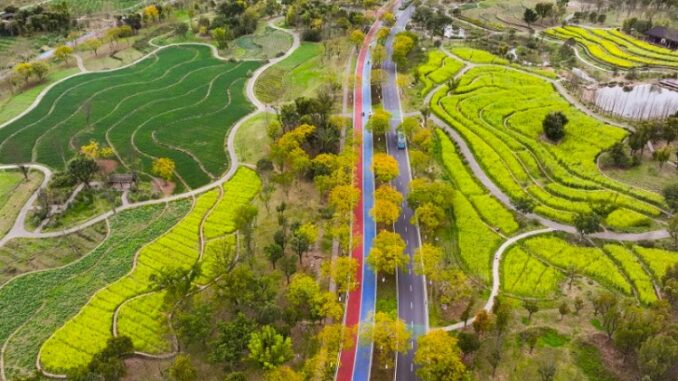
China launches major scientific and technological projects in ecology and environment – Ministry of Ecology and Environment
China has continued to launch a series of major scientific and technological projects and initiatives, including drones, big data, cloud computing, and the internet of things, in the ecological and environmental field, according to the country’s environmental authorities.
The technologies have been effectively applied in the battle against pollution, providing strong support for precise, scientific, and lawful pollution control and the construction of a beautiful China, Wang Zhibin, Director of the Science, Technology, and Finance Department under China’s Ministry of Ecology and Environment (MEE), said during a monthly press conference on Wednesday.
Wang stated that the ministry has continuously deepened technological reforms in the ecological and environmental sector. This includes the implementation of major actions for scientific and technological innovation in ecological and environmental protection and advancing the key national project for comprehensive environmental governance in the Beijing-Tianjin-Hebei region in northern China, thereby strengthening the strategic, scientific, and technological support for ecological and environmental protection.
Since 2023, the ministry has established three key laboratories, such as the Environmental Sensory Stress and Health Laboratory, three engineering technology centers, including the Internet of Things Technology Research and Application in Wuxi, East China’s Jiangsu Province and seven national scientific observation and research stations, such as the Hulunbuir Forest-Grassland Ecotone in North China’s Inner Mongolia Autonomous Region.
Progress has been made in coordinated pollution prevention and control of PM2.5 and O3, ecological and environmental protection and restoration of the Yangtze River, and ecological protection and high-quality development of the Yellow River Basin. This has resulted in over 400 technical schemes and policy recommendations, providing strong support for scientific decision-making and precise implementation in pilot cities.
Wang introduced that as of now, data sets from 25,000 local monitoring stations across the country have been shared online. The ministry has also signed a strategic cooperation agreement with China’s National Space Administration to deepen the application of satellite remote sensing, with the high-resolution spectral observation satellite being put into use. In collaboration with the Chinese Academy of Sciences, the ministry issued the “National Ecological Quality Supervision and Monitoring Work Plan (2023-2025),” establishing the first batch of 55 national comprehensive ecological quality monitoring stations, and completing the construction of automatic monitoring systems for sound environmental quality in 36 key cities. A nationwide agricultural non-point source monitoring network covering 175 monitoring areas has been established.
Taking the ecological and environmental protection and restoration projects in the Yangtze and Yellow Rivers as examples, Wang introduced comprehensive management plans for total phosphorus pollution in the Yangtze River and guidelines for compiling inventories of urban water pollution sources as part of the joint research.
Wang emphasized that the coming five years are crucial for the construction of a beautiful China. The MEE plans to undertake long-term strategic research in the field of ecological and environmental science and technology. It aims to issue policy documents to enhance scientific and technological innovation in the ecological and environmental sector, and support the construction of a beautiful China.
Source: Global Times, Mar 27, 2024. https://www.globaltimes.cn/page/202403/1309632.shtml